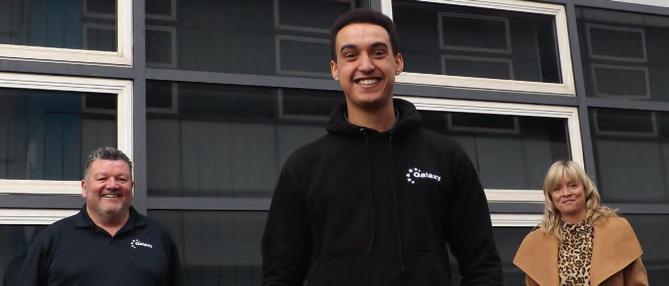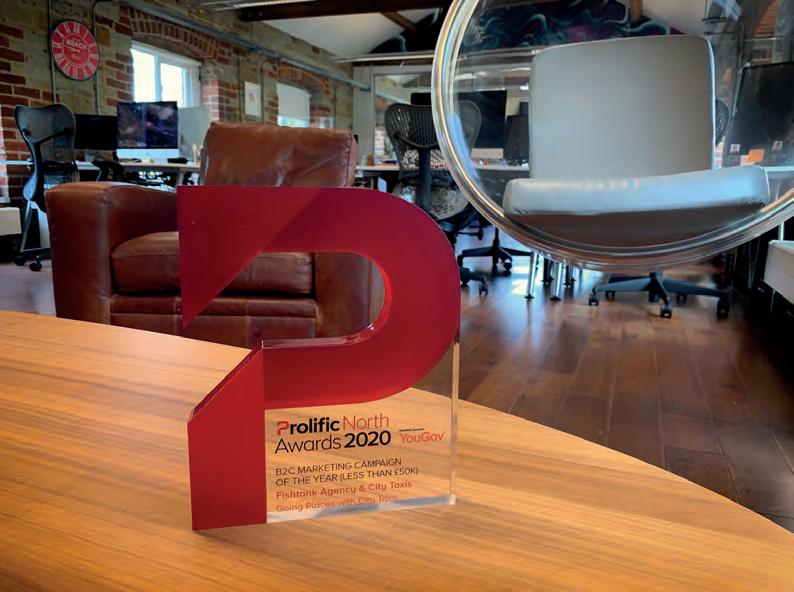
23 minute read
Skills Focus
SKILLS FOCUS SPONSORED BY THE SOURCE SKILLS ACADEMY CITY TRAILBLAZERS SEEKING RAW TALENT TO FUEL DRIVE FOR SUCCESS
Three tech-powered Sheffield trailblazers are among the businesses working with The Source Skills Academy to recruit potential new talent via Kickstart.
Advertisement
City, one of the country’s most successful taxi firms, its app-fuelled delivery business City Grab and sister tech company Caboodleit are giving six unemployed young people the chance to get ‘a foot in the door’ with the government’s new work experience scheme.
If they show the right potential during their sixmonth placements, permanent careers will be on offer.
Kickstart aims to get jobless 16-24-years old receiving Universal Credit on the road to jobs.
“We want to give young people having a difficult time in the pandemic the chance to make their mark with us,” said Arnie Singh, the Sheffield entrepreneur behind the three brands.
Two will be recruited for City Grab, Sheffield's answer to Deliveroo. The multidelivery app platform, which charges lower commission and keeps revenue in the local economy, launched in early 2020 and rocketed as demand for takeaways soared in the pandemic.
The service has now made more than 200,000 deliveries and works with 376 city outlets – from Beres the pork sandwich chain to Nonna’s.
Two recruits at Caboodleit, the tech company which launched City Grab, will learn sales and project management as it sells to DALE ROBINSON AT THE SOURCE WITH ARNIE SINGH, OF CITY TAXIS AND CABOOBLEIT
taxi firms nationally and creates a ‘white label’ tech product tailored for individual food, convenience, and retail outlets.
At City Taxis, two Kickstarters will learn from a vastly experienced team and get an insight into the work ethic needed for success.
Mr Singh is urging other SCR businesses to embrace Kickstart.
“Work experience gives young people the chance to gain experience and prove themselves in the workplace,” he said.
“As an employer, Kickstart gives six months of support as we train people and ensure they are right for us.”
The government funds Kickstart placements, paying the minimum wage for 25 hours a week, N.I and pension contributions and gives businesses grants of £1,500 towards the recruit’s set up and training. Mr Singh is pledging to top up hours and wages to full-time.
Dale Robinson, director of business development at The Source, said: “We are proud to be giving our expertise to City Taxis and Caboodleit, the brains behind City Grab.
“We have now helped more than 65 employers to take on 150 Kickstart recruits.
“Employers who choose us as their training and employment partner can retain the Kickstart grant, while we help their young recruits gain valuable qualifications and key skills.”
The Source Skills Academy in Sheffield is passionate about bringing out the best in people. It has been helping businesses to increase the talents of their teams since 2003 and is proud to sponsor Skills Focus, a monthly spotlight on training and apprenticeship news and funding to help you develop your staff. Contact 0114 2635600 Marketing & thesourceacademy.co.uk
GALAXY APPRENTICE JACK ROBINSON, CENTRE, WITH COMPANY MD TRACY SHEPHERD, LEFT, AND AMANDA BARMBROUGH-SMITH OF THE SOURCE
GALAXY REACHES FOR STAR APPRENTICES WITH THE SOURCE

The Source Skills Academy is providing apprentices across the UK for a hugely successful Sheffield insulation company continuing to grow during the pandemic.
Galaxy Insulation and Dry Lining Limited, a marketleading, independently-owned supplier to the construction sector, decided to launch an apprenticeship scheme to 'future-proof' the business.
It discovered highperforming training and skills organisation The Source Academy was on its doorstep at Meadowhall.
Five apprentices, aged 16 to 22, are now in roles across the country and studying for qualifications in customer service, warehousing and business administration.
The Source is recruiting more apprentices for Galaxy and looking to provide fully-funded training and qualifications for other staff. Galaxy is also working with The Source to assist with recruiting unemployed young people for funded six-month placements under the government’s new Kickstart scheme.
Turnover is now in excess of £66million for Galaxy, which employs 220 and has continued to expand during the pandemic.
New branches opened in Bedford and Newcastle in 2020 and another two are planned in the South West this year, bringing the total to 12.
Galaxy started making contributions to the government’s Apprenticeship Levy in the first quarter of 2020 after its annual wages bill hit £3million.
The Levy exists for employers to fund new apprenticeships in England through the Digital Apprenticeship Service.
“Utilising our Levy funds to support an apprenticeship programme is a win on so many levels – we can increase staff and grow the business and, very importantly, give young people a head-start in a very difficult climate,” said Richard Walker, group operations director.
“Our apprenticeship scheme also helps us to future-proof the business, ensuring the skills of highly-experienced and long-serving employees are passed on.
“We are committed to ensuring apprentices can grow careers with us. Our company ethos is: ‘It doesn’t matter where you start – if you work hard you can achieve and climb the ladder’.”
Jack Robinson, 22, joined Galaxy’s Sheffield HQ in January on a Business Admin Level 3 Apprenticeship.
“I was working at a COVID-19 testing centre and was worried the pandemic would stop firms from recruiting,” said Jack.
“That wasn’t the case at Galaxy. I’m very pleased to be part of the team. An apprenticeship is a great opportunity to show an employer what you can do and gain a qualification while you work.”
Dale Robinson, head of business development at The Source, said: “Despite the challenges of the pandemic we enabled job-seekers throughout the country to find roles at Galaxy, a Sheffieldbased success story.
“We urge companies to remember that apprenticeship recruitment still plays an important part in business strategy and to contact us. Our apprenticeship success rate ranks in the top tier nationally.”
Trained First Aiders will be needed more than ever when schools and businesses reopen after lockdown.
An experienced First Aid training provider, The Source Skills Academy has created a dedicated, COVID-safe Learning Zone on the ground floor of its Meadowhall Way premises and resumed its classes on March 1.
Danny Slinn, employment and skills project manager said: “It is absolutely crucial for organisations to get their First Aiders trained or retrained and ensure they have the knowledge to deal with virus infection risks when people return after lockdown.
“There is new COVIDrisk avoidance advice for something as simple as dealing with a minor cut to giving rescue breaths. The virus is also badly affecting people’s mental health. Training now includes instruction on how to spot the signs and give support.”
Three-day First Aid At Work courses for new learners and two-day refresher courses for First Aid requalification are running every week.
Courses run under tight health and safety measures. Attendees complete a health questionnaire prior to attending, temperatures are checked on arrival and social distancing is maintained throughout.
Go to www. thesourceacademy.co.uk/ commercial-training/first-aid to book, or email training@ thesourceacademy.co.uk
Source comes to aid of the First Aiders

INSTRUCTING AN INSOLVENCY PRACTITIONER ISN’T ALWAYS BAD NEWS

Most people don’t usually look forward to seeing an insolvency practitioner – but as the team at Hart Shaw explain, their work is not all about saving failing companies
A bit like going to the dentist, most people don’t usually look forward to seeing an insolvency practitioner. They assume it will be a painful experience and they will only receive bad news.
Of course, this is not the reality that most people experience. No matter how bad the situation people think they are in, they often leave their first meeting with us with a clear idea of what needs to be done and feeling the weight of the world has been lifted from their shoulders.
But the work we do is not all about saving failing companies. We also provide advice and help to people with successful solvent companies and one of the formal processes we offer is the Members Voluntary Liquidation. This is where we help close and liquidate a solvent company that is no longer required in order to pay its capital value to the shareholders.
A limited company exists in its own right as a legal entity independent of its shareholders and it can own businesses, property and generate wealth. During its life surplus profits can be distributed to the shareholders by the payment of dividends, such dividends being accounted for as part of the shareholders income and taxed accordingly.
However, when a company comes to the end of its natural life, such as when its business has been sold and the shareholders are looking to cash in the value of their shares, it is often more appropriate, and tax efficient, for its value to be returned to its shareholders as a capital payment rather than as income by declaring a dividend. This is achieved with a Members Voluntary Liquidation which can only be carried out by a licenced insolvency practitioner.
The insolvency practitioner will work with the directors to prepare the company for liquidation so as to end up with a balance sheet that often comprises just cash at bank. The directors then make a Statutory Declaration of Solvency to confirm that the company is solvent and can pay its debts in full and the shareholders pass resolutions placing the company into liquidation. Once in liquidation, the liquidator goes through a process to establish that the company has paid all its creditors before distributing the company’s assets to the shareholders as a capital distribution.
Although we often just distribute cash, it is possible to distribute assets – for example a property – direct to shareholders which is called a distribution in specie. In recent weeks we have distributed in specie three residential properties in one liquidation, a trade debtor in another and a stock market portfolio in another. As a member’s voluntary liquidator is acting for the shareholders, (as creditors have been paid in full) he or she can, within reason, do whatever the shareholders require, so a Members Voluntary Liquidation can be very flexible.
As a busy practice, we carry out Members Voluntary Liquidations throughout the year for all types of companies and businesses. However, in recent weeks we have been particularly busy with such liquidations as our clients have been keen to liquidate their companies and distribute the funds to shareholders before the Budget on 3 March, in case taxes are increased.
A Members Voluntary Liquidation is a cost-effective way of closing a company that is no longer required and returning its capital to shareholders and, depending on the circumstances, can be a very flexible process.
IT & CYBER SECURITY
BY IAN SNOW, CT MANAGING DIRECTOR
Ian shares the ‘precision learning’ of the CT Knowledge platform
MAJOR LESSONS FROM MICRO LEARNING PLATFORM

Over the past year, nearly every business has experienced some kind of disruption to operations and, as millions of employees adjusted to working remotely, IT teams had to provide quick solutions to ensure work could carry on as normal.
Businesses have been forced to deploy new tools to help teams collaborate and communicate remotely. But with unfamiliarity and lack of experience with new software, staff are being left frustrated and inevitably on the phone with IT.
At CT, we offer all our customers CT Knowledge – a micro learning platform with a hundred three-minute training sessions which are easy to navigate and help your team make the most of your most important existing and new business platforms.
Utilising your tech platforms effectively and understanding simple security measures is crucial in growing and protecting your business, saving your team time and importantly developing their IT knowledge base. Our aim is simple – to help ensure your business is more secure, efficient and productive.
Through what is coined ‘precision learning’, CT Knowledge gives you more than 100 three-minute engaging training sessions which aim to help your team learn new skills and how to make the most of your important business platforms including 0365, Sharepoint, Windows 10 and Excel.
There are also important videos covering cyber security and mental health in the workplace. Some training sessions are even just 60 seconds long! Users can click, swipe and tap content on their computer, laptop, tablet or phone making it easier than ever to access important IT training courses quickly and easily.
So, for example, if you wanted to learn how to schedule a meeting in Teams, organise your inbox in Office 365, upload and share files with your colleagues in SharePoint or manage large amounts of data in Microsoft Excel, you can learn quickly in just three minutes without the need to ask a colleague, your in-house IT Manager or calling your service desk.
Some of the key benefits include:
Scalability – As best practices evolve and internal processes expand, content can be removed, updated and restructured to fit any company need. Efficiency – Increases learner comprehension and knowledge retention through the use of mediarich learning materials and bite-sized content.
Three-Minute Videos – All of the videos you will find are three minutes or under, giving you precise and bitesized information as you need it.
Develop Personal Skills – There are also important bite-size training videos covering cybersecurity, management skills, and mental health training.
If you would like to find out more, or have a demo of CT Knowledge, please get in touch with one of our account managers today on 01246 266 130.
AHEAD OF THE CURVE (LEARNING)

Rachel Topliss, head of employer academy partnerships and work-related activity at The Sheffield College, tells Jill Theobald how her shared vision with Sheffield Chamber of Commerce then President Steve Manley of boosting the workforce of tomorrow’s employability skills led to the creation of the college’s Business and Enterprise Academy – and how the employer-led academies programme is now putting them and the city ahead of the curve nationally
‘If you can’t see it, you can’t be it’.
This mantra is one that Rachel Topliss head of employer academy partnerships, and workrelated activity at The Sheffield College, uses often during our interview – and it’s not hard to see why
It played a major part in her vision for the College’s employer skills academies to inspire, encourage and support young people with the skills that businesses need by providing real-life examples of role models and successful businesspeople.
And indeed, two years on from launch of the Sheffield Chamber of Commerce Business and Enterprise Academy at the College, that vision has become a reality.
Within three months 900 students had signed up to the academy – that has since gone on to hit a milestone of 1,500.
Rachel’s goal of three academies has become 15 including the Business and Enterprise Academy and academies involving leading businesses Discovery STEM Education, Greene King, Kier Construction, Kryolan, Liberty Speciality Steels, Millgate, MSK Ingredients, NextGen Skills Academy, PJ Taste, Sheffield Sharks, Uniheads and WANdisco.
The college has received Association of Colleges Beacon Awards' commended status for engagement of employers as a result of its academies.
Oh, and earlier this year the Government published a Skills for Jobs White Paper which focuses on the ‘vital role of further education (FE) colleges being at the forefront of a skills led recovery and ensuring employers are at the heart’. The Sheffield College’s academies are a forerunner – not least because the Business and Enterprise Academy was the first time a British Chamber of Commerce had worked with a further education college in this way.
Rachel says they were ‘blown away’ by the White Paper and while the college was not named its recommendations for other chambers and colleges nationwide to follow suit means ‘we have set the precedent now. It rubberstamped our ideas and our vision of what we could do to make the college special.’
Keeping The Sheffield College and the city ahead of the learning and employability curve then – especially as Rachel believes that, thanks to the academies and the support from businesses the college is now, she would estimate, three years ahead of others in the country.
But she is keen to point out that it is down to her dynamic team – and the academies being ‘driven’ by a supportive Chamber and business community.
“The Sheffield College feels so different to any of the other places I’ve worked in such a positive way,” she says. “The businesses and the sense of community, the people’s work ethic and their spirit – I wish I’d gone to work in Sheffield and the area a long time ago because it’s a fantastic place to be and got a real buzz about






it and that’s evident with what we’ve set up with the academies.”
Rachel’s passion stems from her first role after leaving school as overseas operations manager for Thomson Holidays, now TUI, which was ‘very glamourous flying round the world every week’, but at a young age it ‘wasn’t all sandcastles and sangria’. Dealing with serious trauma such as a plane crash on mainland Spain was mentally and emotionally challenging but helped her build her resilience, as well as transferable skills.
She was ‘not necessarily shy but not as confident as other staff’ but grew in confidence thanks to a combination of watching and learning other staff whose skills impressed her and a dynamic businesswoman mentor – in other words, other real-life role models, just like at the academies.
“I learned everything from my mentor and that’s when I thought I need to help other people. I wouldn’t want people to struggle like I did when I thought ‘I can do that’ and then suddenly in middle of something and you’re not resilient or confident.”
Ultimately, Rachel started training and mentoring other managers and became the youngest ever manager for the company at the time aged 22.
“Everything I learned from a corporate company worldwide has transferred into everything else. It’s about determination – I wanted that lifestyle, but I needed to learn how to get there. One of the things I feel strongly about at the college is the ethos of ‘careers not courses’ so my team will ask them what career do you want – apprenticeship, full-time job or university or higher education – and we work back from there and create a bespoke plan for them.”
Which leads us nicely into the academies and The Sheffield College’s pioneering approach.
“When we started looking at what could we do as a team to make the college unique, special, to make employer interaction meaningful – that’s when we came up with the idea of the academy brand.
“In the first year I thought we’d be really successful if we opened three – and we ended up doing 12! WANdisco was our first, then Millgate and then we met Steve Manley.”
The Sheffield business community was ‘so welcoming, almost like it was a business friendship straight away. Everyone wanted to work together, everyone wanted to help everyone else’, says Rachel, adding: “When I met Steve, it was really evident within five minutes that what he wanted to do for the Chamber while he was president was exactly the same vision I had.
“We talked about about his vision, and how I wanted the academy to look like a lecture theatre, so it was more like a university environment, and Steve was very keen for Chamber members to get involved so at the time we had 978 members – every business across the city, every sector, small and large, so it was a great spread for us to start building the academy.”
And after Rachel spoke about the academies at the Chamber annual dinner ‘everything went crazy – everyone wanted to get involved which was great!’
“Some employers wanted to dip their toe in with work placements or guest speaking. Others wanted an academy. It was like a snowball which kept going and it was very hard work – it was one of the hardest things I’ve done in my working career, but so worth it because it’s one of the most rewarding things I’ve done. When you’re working on a project you’re passionate about you can’t stop and you can see how amazing it’s going to be!”
“Steve is very passionate about what we’ve done. He used to go to The Sheffield College, and he set up his own business because he took part in Young Enterprise and is where he is today, so he was very keen to give back. He’s had that experience so when he’s delivering workshops or mentoring students, it’s real because he’s done it.”
Rachel is keen to turn the spotlight, too, on other academy stakeholders including Louisa HarrisonWalker of Benchmark and Sheffield Chamber, City Taxis’ Arnie Singh and unLTD columnist Helen Williams of Helping Entrepreneurs Win (read more about Helen’s work with the college in her feature from page 16).
“We’ve got a really nice mix in Sheffield of corporate companies and SMEs and international companies and some really great personalities at the forefront of those businesses – people like Louisa who is all about collaboration and I think that really helps because behaviour breeds behaviour and that helps us get people on board.
“I always say ‘if you can’t see “We definitely need more women in engineering. Let’s not let fear, age, gender or anything else stop us from dreaming big and being the best we can. We can do it!”
NYACHIENG JOK JOHN, LIBERTY ACADEMY STUDENT
“I joined the academy because Kier has a huge reputation within the construction industry... Since joining in September, the course has exceeded all expectations.”
KIAN BLAKEMORE, KIER ACADEMY STUDENT
it you can’t be it’ so if young people in the community don’t have a role model but want to set up their own business and are wondering if they can they need to build confidence and resilience. They need to see people from their city that have made it as a success – Arnie Singh, he’s young, really relatable and students love him because he’s from Sheffield, he’s built his business and is still here and giving back.
“Helen Williams ran a confidence and resilience workshop, and we can hold 100 people in our lecture theatre – we had to turn staff away and Helen ended up coming back three times because it was that popular!
“To have key stakeholders is an exceptional experience,

"Sport is not just between the competition lines, it is a major business with a lot of strands that need a skilled workforce to deliver and that is what we are here to teach.”
MIKE TUCK, CAPTAIN OF B. BRAUN SHEFFIELD SHARKS
“Having a positive social impact is at the heart of everything we do, and it is a privilege to work with The Sheffield College and support young people in our region.”
HARRY BLISS OWNER OF UNIHEADS AND CHAMPION HEALTH
it really is magical to see how different the students are.”
And Rachel wants to hear from more employers, too.
The message to employers is that the main investment is sharing their time and expertise,” she says. “And whether it’s a day’s work experience, a year’s placement, or a few projects or they want to speak to the Chamber academy – it doesn’t matter, because the more employers we can get involved the more we can help fill the skills gap.
“Now that we’re leading the way with our employer academies, we need to stay front and centre. Without the employers driving that with myself and doing it together it wouldn’t have that buzz and be magical and I can’t stress enough how unique it is because of those employers. They own our academies! I want businesses in Sheffield to see that and say ‘that’s our college and those are our academies and I want to be involved’ because they need to own that as well – we’re all responsible for our workforce.
“We’re all in it together, particularly now under the pandemic and with business recovery. I’ve really felt the business community and the work the Chamber have been doing have really pulled together – we’re a team, it’s not about them and us, it’s about what we collectively do together.
“If a business has ideas of doing something different or special, I welcome them because we can’t not stay out in front now – we’ve got to do it for the city, we’ve got to do it for the north!”
BITESIZE LEARNING LESSONS
GETTING STARTED
“We’ve launched a new programme called Start-up for students with an interest in becoming self-employed because this is going to be a massive growth area.
“The sessions are managed by us under the academy brand and delivered by external speakers in areas like marketing, sales, procurement, mental health, resilience…
“After 10 weeks they get a business mentor for three weeks and can apply for the Twinkl scholarship programme. This is launching in March and going to be a Dragons Den-type set up where they pitch their business plan and can potentially be sponsored by Twinkl to set up. Not only will they win the money, but they’ve got mentors like (Twinkl chief operating officer) David Angrave – that is a priceless prize.”
MARCH-ING AHEAD
“We’re also launching in March a virtual reality (VR) placement platform with interactive voice overs and guest speaker talks so students can experience what it’s like to go on placement at businesses.
“It’s absolutely incredible, I had a vision of what I wanted it to look like and it has completely exceeded that.
“I can’t take credit for this, it is absolutely my team’s work and am keen for us to build on the VR platform this year because that’s going to be huge.”
SKILLS GAPS AND SKILLS GROWTH
“When we started everyone had the same sorts of issues across industries such as ageing workforce. We need to be raising those pathways because if no one goes into a sector, it will die.
“Another big area was digital – businesses’ website needed a refresh or they didn’t have one or didn’t use social media. Our young people know absolutely everything about being innovative with your media profile.
“Recently people are talking about carbon footprint and CSR – we’re seeing more jobs that weren’t there two years ago.
“The biggest thing now will be innovation – young people either with change management ideas or setting up as self-employed.”
SPRINGING BACK FROM COVID
“The academies have become more crucial through the pandemic and spring-boarded because we were already doing virtual webinars and pre-recorded workshops.
“The only thing that’s changed is students aren’t physically in the academy branded spaces, they’re at home, but still completely committed to those employer sponsors. That’s really evident in our data because we have a 97 per cent retention rate.”
“If anything, they’ve thrived, and my team have been able to launch things like the virtual placements, but we couldn’t have done that without the academy brand. I couldn’t be more proud of them.”










